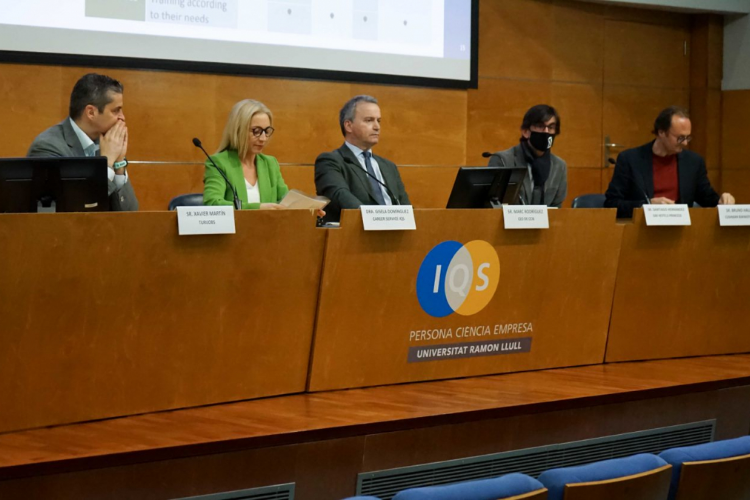Flexibility, work-life balance, and emotional salary are improvements to working conditions that are key to attracting and retaining talent in the tourism sector. This is one of the conclusions reached at the “Attracting and retaining talent in the tourism sector following the reopening and reactivation of the economy” seminar organized by IQS, which featured participation from professionals and experts in the sector.

Flexibility, work-life balance, and emotional salary are improvements to working conditions that are key to attracting and retaining talent in the tourism sector. This is one of the conclusions reached at the "Attracting and retaining talent in the tourism sector following the reopening and reactivation of the economy" seminar organized by IQS, which featured participation from professionals and experts in the sector.
“The sector needs professionals with the knowledge and skills required to manage and lead through innovation and strategic thinking more than ever,” said Dr Itziar Ramirez, professor with the Undergraduate Programme in Tourism and Hospitality Management at IQS.
In Dr Ramirez's lecture "When values are the key to talent retention," he highlighted conclusions from his study ”An approach for reducing hospitality industry turnover ratio by understanding Millennials' work motivation based on values and their personality traits." The study analyses the profile of Millennials in the labour market, who are characterized by having a different professional perspective compared to earlier cohorts, which requires companies to make an effort to understand this generation's needs. This change to the workplace motivations of young people employed by companies affects not only the tourism industry, but is also generational and applies to all business sectors.
Dr Ramirez pointed out that the tourism sector is changing and needs flexibility in terms of schedules. He also stressed the need to embrace work-life balance as demanded by employees.
Along these same lines, Santiago Hernández, General Manager of the Hotel Negresco and Hotel Barcelona Princess, underscored the notion of emotional salary as a key factor in attracting and retaining employees during a roundtable session that also featured participation by Xavier Martín, founder of Turijobs, Gisela Domínguez, Career Services Manager at IQS, Marc Rodríguez, CEO of CCIB Fira Barcelona, and Bruno Hallé, Partner & Co-Head of Hospitality at Cushman & Wakefield, as the moderator.
"Emotional salary isn't measured in euros, but in facilitating, for example, work-life balance with schedules that are adapted to each job and each person," Hernández stated. The importance of working for a company with values and a solid work environment are also factors that aid in employee retention. “If the workers are happy, turnover will cease to exist,” concluded Gisela Dominguez, Career Services Manager at IQS.
Signs of recovery in the sector
The speakers agreed that the "technological revolution" is another phenomenon in the sector post-pandemic. Among other consequences, technology will make dealing with customers more comfortable. "Something more like a concierge service will be offered rather than just reception. Check-in will be done online,” claimed Santiago Hernández.
For Marc Rodríguez, CEO of CCIB, technology is here to stay, but he emphasized that "in the sector, personal treatment is and will remain essential, so employees will always be necessary." He also stressed that "the tourism sector's resistance has been greater than it appeared, and despite the changes, people's presence is irreplaceable." Rodríguez also stated that face-to-face events in the venue he manages have returned with even greater strength.
Regarding the sector's recovery, Xavier Martín, founder of the Turijobs employment portal, pointed to the improving situation by stating that "in February of this year we registered 40% more offers than over the same month in 2019. In fact, more offers have already been posted for March this year than in March for the last two years combined."
In relation to the future of the profession, Gisela Dominguez, Career Services Manager at IQS, has witnessed a change in student aspirations: "They're enthusiastic about the profession again, but the positions they are seeking have changed. They’re showing increased interest in back-office positions such as Human Resources and Finance,” she concluded.
IQS offers education in hospitality through the Undergraduate Programme in Tourism and Hospitality Management, ranked the second best Undergraduate Programme in Tourism in Spain according to the QS World University Ranking by Subjects 2021, and the Master in Hospitality Management and the Master in Event Organization and Business Tourism, ranked among the five best specialized tourism programmes in Spain according to the El Mundo 2021 ranking.
Taught through IQS Executive Education, these masters offer top-tier specialized training for professionals who want to strengthen their career in the sector.










